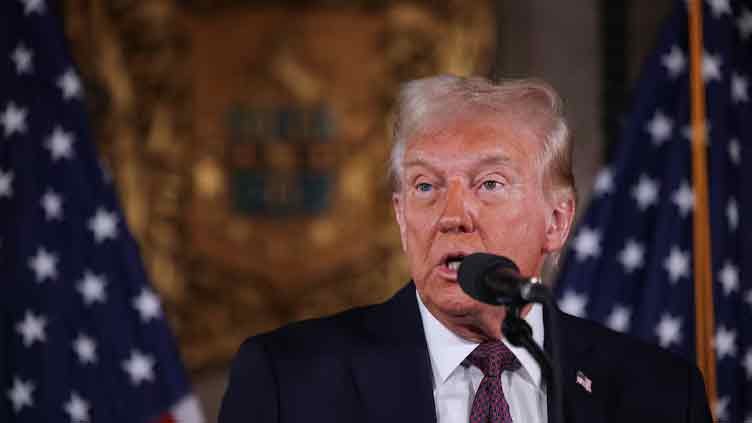US Supreme Court lets Trump sentencing proceed in New York hush money case

World
His inauguration for his second term as president is scheduled for Jan 20
WASHINGTON (Reuters) - The U.S. Supreme Court cleared the way on Thursday for Donald Trump to be sentenced for the president-elect's conviction on criminal charges involving hush money paid to a porn star, with two conservative justices joining the three liberal members in a 5-4 decision.
The court turned down Trump's last-minute bid to prevent his sentencing, scheduled for Friday in New York state court in Manhattan 10 days before his inauguration for his second term as president. Chief Justice John Roberts and fellow conservative Justice Amy Coney Barrett joined the court's three liberal justices - Sonia Sotomayor, Elena Kagan and Ketanji Brown Jackson - in forming a majority to deny Trump's request.
The court's brief, unsigned order gave two reasons for the decision.
"First, the alleged evidentiary violations at president-elect Trump's state-court trial can be addressed in the ordinary course on appeal. Second, the burden that sentencing will impose on the president-elect's responsibilities is relatively insubstantial in light of the trial court's stated intent to impose a sentence of 'unconditional discharge' after a brief virtual hearing," the order stated.
The trial judge, Justice Juan Merchan, said last week he was not inclined to sentence the Republican president-elect to prison and would likely grant him unconditional discharge. This would place a guilty judgment on Trump's record, but would not impose custody, a fine or probation. Merchan is set to sentence Trump at 9:30 a.m. (1430 GMT) on Friday.
Four conservative justices - Clarence Thomas, Samuel Alito, Neil Gorsuch and Brett Kavanaugh - dissented from the decision, noting they would have granted Trump's request. They did not provide their reasoning.
The court has a 6-3 conservative majority. Trump appointed Gorsuch, Kavanaugh and Barrett to their lifetime posts on the court during his first term in office.
Trump said in remarks at his Mar-a-Lago residence in Florida after the Supreme Court's order: "I read it, and I thought was a fair decision, actually."
Trump added on his social media platform: "For the sake and sanctity of the Presidency, I will be appealing this case, and am confident that JUSTICE WILL PREVAIL."
Trump had sought relief from the justices as he pursued a state court appeal to resolve questions of presidential immunity following a landmark Supreme Court ruling last July that granted former presidents broad immunity from criminal prosecution for their official acts.
The Supreme Court acted after New York's top court earlier on Thursday rejected Trump's request to halt the sentencing.
Manhattan District Attorney Alvin Bragg's office made a filing at the Supreme Court on Thursday morning, opposing Trump's bid for a stay.
Trump in a Supreme Court filing made public on Wednesday had asked for proceedings in the case to stop as he seeks an appeal following the Supreme Court's immunity ruling.
"This appeal will ultimately result in the dismissal of the District Attorney's politically motivated prosecution that was flawed from the very beginning," Trump's lawyer John Sauer wrote in the filing.
Trump was found guilty by a jury last May of 34 counts of falsifying business records to cover up a $130,000 payment to porn star Stormy Daniels in exchange for her silence shortly before the 2016 U.S. election about a sexual encounter she has said she had with Trump a decade earlier, which he has denied. Prosecutors have said the payment was designed to help Trump's chances in the 2016 election, when he defeated Democrat Hillary Clinton.
Trump is the first former U.S. president to be criminally prosecuted and the first former president convicted of a crime.
Trump has denied any wrongdoing.
Trump's lawyers contend that prosecutors improperly admitted evidence of Trump's official acts during the trial. They also argue that, as president-elect, Trump is immune from prosecution during the period between his November election victory and his inauguration.
'ONLY ONE PRESIDENT AT A TIME'
In their filing on Thursday to the Supreme Court, the New York prosecutors said that "all of the evidence defendant challenged in his post-trial motion either concerned unofficial conduct that is not subject to any immunity, or is a matter of public record that is not subject to preclusion, as the trial court correctly held."
As to Trump's argument that he is immune as president-elect, the prosecutors said this "extraordinary immunity claim is unsupported by any decision from any court."
"It is axiomatic that there is only one president at a time," they added.
In the 6-3 July ruling authored by Chief Justice John Roberts, the Supreme Court said immunity for former presidents is "absolute" with respect to their "core constitutional powers," and a former president has "at least a presumptive immunity" for "acts within the outer perimeter of his official responsibility," meaning prosecutors face a high legal bar to overcome that presumption.
Merchan in December rejected Trump's immunity argument, finding that the hush money case dealt with Trump's personal conduct, not his official acts as president.
The Supreme Court's decision on Thursday came after it gave Trump victories last year in three important cases. In addition to the immunity ruling, the justices reinstated Trump to the presidential primary ballot in Colorado and raised the legal bar for prosecutors pursuing obstruction charges in a since-dismissed election subversion criminal case against Trump.


